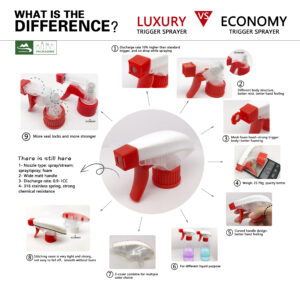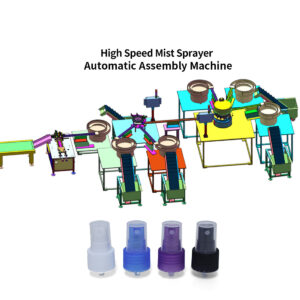- Different material
All-plastic pumps are manufactured entirely of plastic, including the pump body, springs, and other internal structural pieces, and do not utilize any metal.
Ordinary emulsion pumps are often built of plastic and metal, with the internal spring and other important components made of metal. - Environmental friendliness
All-plastic pumps: Because there are no metal elements, an all-plastic design allows for easier recycling and reuse, making it environmentally benign and excellent for brands pursuing sustainable development.
Ordinary emulsion pumps: Because of their combined metal and plastic structure, the recycling and disposal procedure is more involved and needs material separation, making them more difficult to dispose of. - Corrosion resistance
All-plastic pumps: Because there are no metal parts, all-plastic pumps are more corrosion resistant when exposed to formulations including acids, alkalis, and other substances, and they are suited for a larger range of product kinds.
Ordinary emulsion pumps: metal springs are quickly corroded by certain chemical components, reducing pump service life and functional stability. - Production costs
All-plastic pumps: Because of their basic structure and lack of metal, they are typically less expensive to manufacture, particularly in big volume production.
Ordinary emulsion pumps: the manufacturing process is more complex, with metal and plastic elements, resulting in greater costs. - Suitability
Tout-plastik ponp yo apwopriye pou tout machandiz ki enplike losyon, krèm, ak pwodwi netwayaj, patikilyèman nan mache ki gen estanda anviwònman sevè, tankou swen pou po òganik oswa pwodwi natirèl.
Ordinary emulsion pumps: acceptable for typical emulsion goods, but may not be suited for some unique formulas due to limitations in metal components.
All-plastic pumps are highly recyclable due to their single-material design, which makes them easier to recycle and dispose of, hence reducing their environmental impact.
More chemically resistant: the all-plastic design eliminates the possibility of metal corrosion, making it ideal for products with active chemicals or strong acidity.
Cost savings: Because all-plastic pumps are manufactured more simply than typical emulsion pumps, they have superior cost control.
Reduced production complexity: The all-plastic design streamlines the manufacturing process by eliminating the need to treat or protect metal parts.

Deklanche vaporisateur: Ideal for Versatile Liquid Dispensing
The Trigger Sprayer is an indispensable tool in the packaging of cosmetics, household cleaning and personal care products. It can precisely control the amount of liquid dispensed and can be used in a variety of application scenarios. We will take a deep look at the features, application scenarios and how the Trigger Sprayer can bring value to your products.










